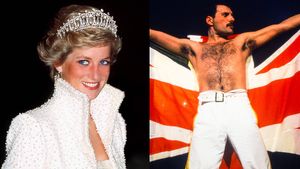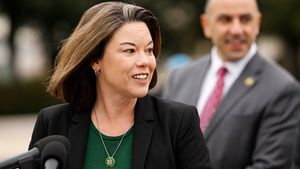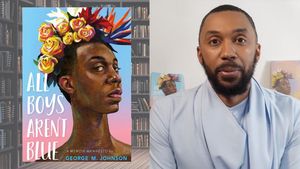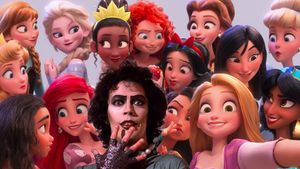The Aces are in their vulnerability era.
The band just released their third studio album, I've Loved You For So Long, which they call their favorite body of work yet. It's a breezy, feel-good record shimmering with some of their most personal lyrics yet, tackling heavier topics like depression and self-doubt with an infectious airiness. It's a new direction for girls, 3 of 4 of whom are openly queer, to share so much from their own lives.
Perhaps that's why fans, especially young queer ones, are drawn to them.
Recently, they performed for a small group of superfans for the "Off the Record" series at the Kimpton Alma Hotel in San Diego, the sales of which benefitted the Trevor Project and The National URBAN League, which hopes to "reduce equality gaps, empower communities, and enable African American and other underserved urban residents to thrive."
Just after the show, adrenaline still high, Out caught up with the bandmates — Katie Henderson, McKenna Petty, and sisters Alisa and Cristal Ramirez — in their hotel rooms to chat about their honest new album, religion, pandemic life lessons, the lasting effects of being raised Mormon, and their retrospectively queer evolution over the last few years.
 Julian Burgeño (Courtesy of Red Bull Records)
Julian Burgeño (Courtesy of Red Bull Records)
Out: You just performed a very intimate show around a pool. How do y'all feel? You had a lot of fans screaming every word.
Cristal: Dumfounded. Literally dumbfounded.
Katie: The words to describe it was unexpected.
Alisa: We did something else with Kimpton a month ago, but it was just a corporate thing and I thought it was going to be the same thing.
Cristal: And that's giving, we need to check our G-Cal. We're not asking the right questions.
We have these balconies like in our rooms where you can look down so I kept peeking out to see because when we heard that fans were gonna come. When we came out, it was packed. It was just so fun. I feel energized. So fun to show up and get that kind of support, especially after so long not touring.
McKenna: We rarely do shows like that too with fans. I love that because it just gave a different energy. It was just fun. Like so experimental, like we could just play and jam. Campfire vibes.
Back in January, you played a White Claw event at Sundance in Salt Lake City. I know y'all are from Utah. Does playing near your hometown bring up any feelings?
Cristal: It's a bit of a double-edged sword.
McKenna: They're a scorned lover.
Cristal: Exactly. Our hometown's a scorned lover. We love them but, you know, it's like the culture...
Katie: We represent a lot to the people that live there.
Cristal: The people that get it, they really get it and the people that don't, they really don't.
Alisa: We're definitely the counterculture.
McKenna: And it can be triggering for a lot of people.
Alisa: We trigger them, they trigger us.
Cristal: On one hand, you know, doing something that's different being all women being queer, being this band that I think is very much not what we grew up around, like a lot of the musicians and people that come from Utah are very like white men playing folk and pop music.
Alisa: Or Imagine Dragons.
Cristal: It's no shade to them.
Ally of the year.
Cristal: But when you grow up in this setting that's just us wanting to be ourselves. It was very polarizing for me. We love our hometown and the people that don't fit the status quo of that hometown, they really latch on to our band and they really support us. We feel that hometown love that way. I think we always felt like we needed to really work to win over our hometown because they weren't super open arms.
Alisa: We just didn't fit the status quo like at all. Like pretty much ever from, even when we were super young just playing like the local venues and stuff.
Cristal: Before we were even out or anything, just women on stage.
Alisa: Even now, our biggest shows are not our hometown shows. Our biggest shows are New York and LA and I don't even think that's a population thing. I think that's a culture thing, to be honest. Scorned lover.
I'm from Texas and people have a hard time associating queerness with the people in Texas, but we exist. It might not be what you think of when you think of Texas or when you think of Utah, but we're there.
Cristal: There is a counterculture living underneath everything. The amount of people that we went to high school with that have now come out. We were all just going to high school not knowing these things about each other.
Alisa: All of our best friends in high school were gay, but none of us were out yet. We just gravitated toward each other.
Katie: We have one gay club and like, seeing friends that you have and you're like, "you're here?"
Cristal: We do it for that, you know? We go back and we go to places in the south and, you know, places that maybe a band like ours wouldn't be as openly accepted and tickets are maybe a little lower. But the people that come to those shows, like it means everything is there. We're in Saint Louis and people are coming up to us and being like, "thank you so much for coming to Saint Louis. We need a band like you. I feel trapped in whatever my hometown," whatever it is, right? When we tour, we really get a taste of that. We're really needed in these spaces even though it might not be our biggest market, even though we might not be the biggest, most celebrated artist, right? We're needed there for these people really need it. That's very rewarding.
On Instagram, you said this new album is your favorite music you've ever made. Why?
Alisa: I think that it's just probably the deepest we've ever gone. It's like a really introspective album, like me and Cristal talk about this all the time. It feels like on our last two albums, we were more focused on external things like romantic relationships, other people kind of stuff like that. This album is largely focused on where we came from and our teen years, kind of unpacking a lot of stuff. We talked a lot about Cristal's anxiety and mental health, things we've never explored before, and admitting to things that we've never admitted before. I feel like The Aces has always been really positive. If not positive, like, "fuck you, you broke my heart" vibes. But topically, it felt often more surface than this record does. The pandemic is a big part of that even being possible with us all being forced to sit home with the rest of the world and do nothing for so long. Even though we were working a record at the time when you spoke to us, but it was like, you know, we'd have like a Zoom interview in the day and then just be like...
Depression!
Exactly. We had enough time and space to be alone that like there was no hiding or running away from or distracting from the demons anymore. It was kind of like, ok, like, remember that trauma from when you were 15, she's here.
Cristal: She's lurking!
She never leaves.
Alisa: This set the foundation for us to be able to go in and make a record, especially in the context that there was no pressure. We had a brand new record and we had no idea what was gonna happen in the world so we were really just going into the studio with like, let's talk about the only thing that's happening right now.
Cristal: Our only desire was to create and to feel comforted through the creation of our music with each other. Doing that, it's a very vulnerable approach. There was just a big question the entire time that we were always asking each other, which is like, "why do we make music and what's important?" And I think everyone was asking that question, like, "what's important to me? What do I need to clear out and get rid of? What do I need to prioritize in my life?" Through those questions, we were just able to get really close as a band and as sisters and family because we've been doing this for so long together and just start really exploring what it was like to come from Utah and three out of four of us to be queer and Ken [McKenna] to have left the faith. There's like a lot of loaded history within our band and for the first time ever, we were able to really explore that.
McKenna: And for the first time ever, we were all in the same place. With other records, we weren't all in the same spot.
Cristal: Religion.
Katie: We weren't all out
Alisa: We were all raised Mormon, but we all left at very different times and then three of us are gay, but we all came out at different times. But we've been a band the entire time. It's very much like everyone kind of almost catching up. Like I can share my opinion on how I feel about this but I don't want to, like, blatantly disrespect my sisters and band members who don't feel the same as me. You know what I mean? So, now we're all at the same place, like "fuck that!"
I can't imagine if someone asked me when I was like 20, when I didn't know who I was, someone being like, "now talk about who you are."
Cristal: I just turned 27 this last end of the year and now as I watch artists who are younger than me, artists that are coming up and they're like 20, 21. There's this pressure, you know? It's their first record and people are critiquing them like they don't have a voice. Like, of course they don't have a voice!
Alisa: You're trying on a trillion different hats when you're 20 years old.
Cristal: The idea that you're going to know who you are at 20 years old is insane. We need to just let people figure it out and develop and try things and figure out who they are. Our band has been such a safe space for us to do that.
What was the inspiration behind the music video for "I've Loved You For So Long"?
Cristal: It was just us. For the first time, I feel like we didn't have a reference.
Alisa: It originally started as a bunch of BTS from the day we did our album photo shoot and shot all of our visuals. We basically have smaller visuals for every song off the album but that's the one full-length video.
We did this crazy two-day shoot and the original music video for "I've Loved You for So Long" was that shot of us in the back of the car that we got for our album cover mixed in with like some fun super BTS of that day. We were watching it back and I wanted it to feel really candid, like nothing was thought out about it. It just felt like jubilant and free form and silly and I showed it to the girls and the girls were like, well, why don't we like, like kind of top this off with just like a day of us hanging out and they get so much footage and we were like, ok, yeah, let's do it. So I just borrowed a Super 8 from my friend and we just drove up Griffith.
So it's film?
Cristal: It's all film. That was like a really intentional thing that we did because we wanted it to all just feel... If there is a reference, it's reminiscent of bands like New Wave, The Cure, like just very like DIY, British, nostalgic, like you're just hanging out with your friends kind of thing. At our core of The Aces, we're just friends. We've known each other for our whole lives. A lot of pictures that are gonna come out on this record cycle we've taken of each other. That's been intentional because I feel like, you know, the more comfortable you can be in front of the camera, the more comfortable you can be when you're making your art, is when you can really make your best art. So we've been really intentional with like, you know what, can we just shoot it? Can we just take it upon ourselves? Because there's no one we're more comfortable with. That's where the authenticity really lies within us four.
I interviewed y'all in 2020 just before Under My Influence came out, which feels like a lifetime ago now. What do you think about your journey as a band since 2020?
Alisa: I feel like I definitely changed. So many of my core beliefs just changed. Related to like our artistry and stuff, I feel like I realized a lot of things about the way I was making music for the past few years since, like, being signed so young and like, feeling the pressure to make something successful, make something commercial and kind of just realizing how that's kind of sucking the joy out of what I do. That's actually making me not feel as connected to the art that I'm making. This internalized capitalism thing was kind of eating my brain. And I was like, oh, I actually don't want this to affect my music-making ever again.
That was right in the perfect timing of when we started making this record, me and Cristal had some deep talks about that. Just being like, let's not think about anything commercial. Let's not tailor any of this to be palatable for anybody. Let's just make truly, truly what feels authentic to us and what makes us excited and just roll with that, whatever that is.
Cristal: Just following like that excitement on this last record is what we did and I think we've changed so much, you know, like I've grown so much. I would say that we're all in like just much healthier mental places with the religion we were raised in.
McKenna: Before the pandemic, I was still pretending to be Mormon. 2020 was like the first time where it was like, it doesn't matter if you go to church when people aren't watching you and judging. You need so much space to be like, wait, do I even believe this is real? I just felt so concerned about what people thought about me, but that's like the culture we're raised in too. That's how we're kind of taught to think. That was the first time I went to therapy and was like, wait, I don't want to do this. A deconstruction, faith crisis. It's like everything you're taught.
Cristal: Faith crisis, career crisis, Katie came out. There was just so much, I think we were just really forced into the most truthful lives we've ever lived, individually and as a band.
McKenna: And we learned to stop caring what other people think about us in so many ways, whether it's the art that we make or how we're presenting ourselves
Cristal: Just like how we feel. That's the main thing we started with like, how do we feel? Do we like doing this? Do we like the people around us? And then we just started making lists of things like what we wanted.
When you're brought up in religion, asking what you want and feel can be such a revolutionary question.
Cristal: You're not tuned into how you feel about things.
McKenna: You're looking to an authority figure to find that rather than connecting to yourself. That is just huge, especially as a woman too, to finally be able to be connected to yourself in that way.
Cristal: I think the art just benefited so much and even outside of the art, just how we feel. We're grateful, we're way more excited about what we do. We're not nearly as caught up in the numbers of things or the quote-unquote success of things. Success has been deeply redefined for us as a band, which has been so refreshing. We all feel deeply successful already about everything we've done. We're just excited to get to connect more and to reach more people and to have the opportunities that we have. It's just a lot less about trying to be anything, just letting things be as they are and enjoying the process and just trying to be present.
Y'all are doing what you love and you have fans screaming at every word right in front of you, that's all you can really ask.
Cristal: And that's coming from Utah. We'd say we want to be in music and people would be like, what? We'd be like, no, we see this thing in our head and we know we're going to be successful as a band. And people just did not understand what we were doing.
McKenna: I still go to family parties and people are like, "how are you making money?"
Alisa: They don't understand.
McKenna: Like, I am a successful musician.
Cristal: Grandma doesn't get it. But Grandma doesn't get most things and that's totally fine. And we just love what we do more than ever. That's been like the greatest gift of that kind of breakdown through COVID.
McKenna: Breakdown to breakthrough. And I'll leave it at that.
Who said that? Is that Brené Brown?
Taylor Swift.
Oh! The modern-day Brené Brown.
[laughs] Yeah.
I've Loved You For So Long is out now, wherever you stream music.


































 Julian Burgeño (Courtesy of Red Bull Records)
Julian Burgeño (Courtesy of Red Bull Records)






















